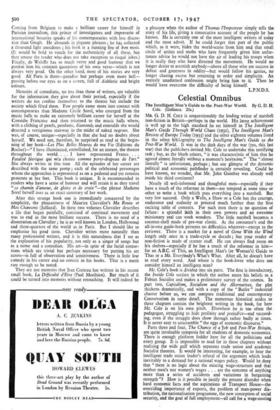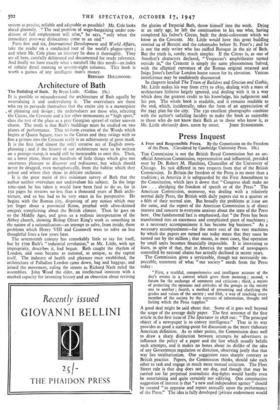Celestial Omnibus
The Intelligent Man's Guide to the Post-War World. By G. D. H. Cole. (Gollancz. 21s.) MR. G. D. H. COLE is unquestionably the leading writer of nutshell non-fiction in Britain—perhaps in the world. His latest achievement is well up to the high standard he set himself in The Intelligent Man's Guide Through World Chaos (1932), The Intelligent Man's Review of Europe Today (1933) and the other eighteen volumes listed in the select bibliography to The Intelligent Man's Guide to the Post-War World. It was in the dark days of the war (yes, this last war) that the publishers invited Mr. Cole to undertake this terrifying task ; but, as the blurb relates, "it was characteristic of him that he agreed almost literaily without a moment's hesitation." The "almost literally" is unfortunate, perhaps ; but our glimpse of the dynamic political and economic pathfinder is certainly revealing. Could he have known, we wonder, that Mr. John Gunther was already well inside his third continent?
Nearly all well-informed and thoughtful men—especially if they have a touch of the reformer in them—are tempted at some time or other to write a book which puts everything into a nutshell. But very few succeed. Only a Wells, a Shaw or a Cole has the courage, endurance and audacity to proceed much further than the first exciting table of contents. For such men there is no question of failure : a splendid faith in their own powers and an awesome missionary zeal can work wonders. The little nutshell becomes a coconut-shell made of pre-war elastic. At the consumer's end the all-in-one guide-book presents no difficulties whatever—except to the reviewer. There is a market for a novel of Gone With the Wind length only once in a trade-cycle or decade ; but your reader of non-fiction is made of sterner stuff. He can always find room on his shelves—especially if he has a touch of the reformer in him— for an A.B.C. of-This' an Intelligent Man's (or Woman's) Guide to That or a Mr. Everybody's What's What. After all, he doesn't have to read every word. And where is the book-lover who does not consider himself an intelligent man?
MI. Cole's book is divided into six parts. The first is introductory, the Inside Cole section in which the author states his beliefs as a Fabian Socialist and makes a preliminary survey of the cosmos. In part two, Capitalism, Socialism and the Alternatives, the plot thickens dramatically, and with a copy of the " Butler " industrial
charter before us, we can compare traditional and contemporary Conservatism in some detail. The numerous historical asides to
these chapters contain the brightest writing in the book, for here Mr. Cole is on his own pitch. Elsewhere he is too often the pedagogue, struggling to hide prolixity and prejudice—and succeed- ing, even if the struggle does show through rather badly at times. It is never easy to unscramble "the eggs of economic discourse."
Parts three and four, The Chance of a lob and Post-War Britain, are quite invaluable symposia for all students of domestic economics, There is enough platform fodder here for all the politicians and
every group. It is impossible to read far in these chapters without realising the wide gulf which separates trade union and academic Socialist theories. It would be interesting, for example, to hear the intelligent trade union leader's refutal of the argument which leads inevitably to a demand for a national wages policy. Would he deny that "there is no logic about the existing wage-structure and that
neither men's nor women's wages . . . are the outcome of anything more than a series of accidents and variations in bargaining
strength "? How is it possible to justify the present disorder when hard economic facts and the aspirations of Transport House—the overriding importance of exports, the problem of man-power dis-
tribution' the nationalisation programme, the new conception of social security, and the goal of full employment—all call for a wage-costing system as precise, reliable and adaptable as possible? Mr. Cole looks ahead gloomily. "The real problem of wage-bargaining under COD,- ditions of full employment will arise," he says, "only when the immediate post-war dislocations come to an end."
Parts five and six, International Development and World Affairs, take the reader on a conducted tour of the world's plague-spots ; and when Mr. Cole plans an itinerary he does it thoroughly. They are all here, carefully delineated and documented for ready reference. And finally we have exactly what a nutshell like this needs—an index of infinite detail running to seventy-eight columns. This book is worth a guinea of any intelligent man's money.
BERNARD HOLLO WOOD.



































 Previous page
Previous page